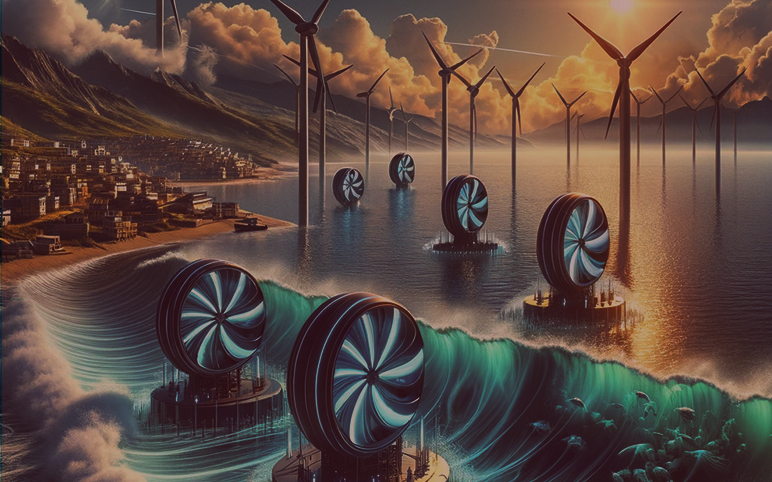The quest for renewable energy sources has
led humanity to harness the power of the sun, the wind, and even the heat
beneath our feet. But one of the most potent forces on our planet — the oceans
— remains a frontier of untapped potential. Wave and tidal energy represent a
constant and incredibly large source of power. Yet, despite the allure of this
clean energy, the path to harnessing it is fraught with challenges, both
technical and environmental. Expert consultation is crucial in navigating these
challenges, ensuring that wave and tidal energy can become a reliable part of
our energy mix.
Understanding the Power and Potential
Wave and tidal energy are forms of
hydropower that generate electricity from the movement of water. Unlike other
renewable resources, they are predictable and can produce a steady supply of
power. The world’s oceans are an immense energy reservoir, with the potential
to provide a substantial portion of global electricity needs. This makes the
technology particularly attractive for coastal communities, where it could lead
to energy independence and sustainable economic growth.
Technical Challenges
The technical challenges of wave and tidal
energy are significant. One of the primary issues is the harsh marine
environment, which can lead to rapid wear and tear on equipment. Saline water
is corrosive, and the force of the ocean can be destructive. Ensuring the
longevity and reliability of wave and tidal energy devices is a priority, and
this is where expert consultation becomes indispensable.
Marine engineers, for instance, are
essential for designing devices that can withstand the ocean’s might. They help
in selecting appropriate materials, designing for resilience, and in the
placement of devices to optimize energy capture while minimizing potential
damage. Moreover, the nascent stage of technology means that there are no
standard designs for wave or tidal generators, unlike the well-established wind
turbines. Experts in hydrodynamics and mechanical engineering are at the
forefront of devising innovative designs that can capture the ocean’s energy
more efficiently.
Environmental and Ecological Considerations
Environmental expertise is equally
important. The installation of wave and tidal energy infrastructure can have
profound effects on marine ecosystems. For example, the noise and presence of
machinery can disrupt the natural patterns of marine wildlife. It’s crucial to
conduct thorough environmental impact assessments before proceeding with any
project in the marine domain.
Marine biologists and environmental
scientists play a critical role in assessing the potential impact of wave and
tidal energy projects and in developing strategies to mitigate these effects.
They ensure that renewable energy goals are balanced against the imperative to
protect marine life.
Navigating Regulatory Frameworks
Wave and tidal energy projects often fall
into complex regulatory frameworks that govern the use of maritime spaces.
Legal experts in marine law can provide vital guidance to navigate these often-uncharted
waters. These specialists help to understand and influence the policies and
regulations that impact the development of marine energy projects.
The Role of Economic Analysis
No less important is the economic aspect.
The current cost of wave and tidal energy is higher than that of more
established renewables, such as wind or solar. Energy economists can provide
insights into the market dynamics and the potential for cost reduction as the
technology matures and scales up. They also assist in identifying financing
opportunities and in developing business models that make wave and tidal energy
projects viable and attractive to investors.
Grid Integration and Energy Storage
Integrating wave and tidal energy into the
existing power grid is a significant challenge that requires specialized
expertise. Electrical engineers and grid integration specialists are key to
ensuring that the intermittent power generated from the oceans can be delivered
reliably to where it is needed. These experts work on developing advanced
control systems to manage the flow of electricity from wave and tidal sources,
which is critical for maintaining grid stability.
Energy storage also plays an essential role in this context. Due to the variable nature of wave and tidal energy, experts in energy storage solutions are critical in devising methods to store excess energy during high production periods. Innovations such as battery technologies, pumped hydro storage, or even hydrogen production can be integrated into wave and tidal energy systems to ensure a continuous energy supply that meets demand.
Community Engagement and Social Acceptance
The successful implementation of wave and
tidal energy projects also hinges on social acceptance and the support of local
communities. Experts in public relations and social sciences are instrumental
in engaging with the public, informing them about the benefits and potential
impacts of wave and tidal projects, and addressing any concerns.
Community engagement professionals work to
ensure that the voices of local residents, businesses, and stakeholders are
heard and considered during the planning and development phases. These efforts
can lead to better project designs that consider local needs and can enhance
the social license to operate, which is often as critical as the actual
licensing and permitting processes. Furthermore, by fostering community
involvement, there is an opportunity to create shared value, where local
communities directly benefit from the projects through job creation, energy
savings, and infrastructure improvements.
Broadening the Perspective
In the pursuit of harnessing ocean energy,
the interplay of these varied facets—technical, environmental, regulatory,
economic, grid integration, and community engagement—forms a complex tapestry
that requires a holistic approach. Expert consultation in these additional
aspects ensures not just the operational success of wave and tidal energy
projects but also their acceptance and integration into the wider energy system
and society.
The future of wave and tidal energy depends
on our ability to not only develop the technology but also to seamlessly
integrate it into our energy infrastructure and our communities. As the field
grows, the value of diverse expertise cannot be overstated, providing the
compass needed to navigate the challenges and ride the wave of innovation
towards a more sustainable energy future.
Harnessing the Power of Diverse Global Insights and Revolutionary Research Techniques
At Astute Connect, we pride ourselves on our global market research teams, whose diverse expertise spans continents and industries. Our innovative methodologies and unique perspectives converge to deliver bespoke solutions, tailored to meet every nuance of your business needs, ensuring not just growth, but a trajectory towards industry leadership
Contact Us


